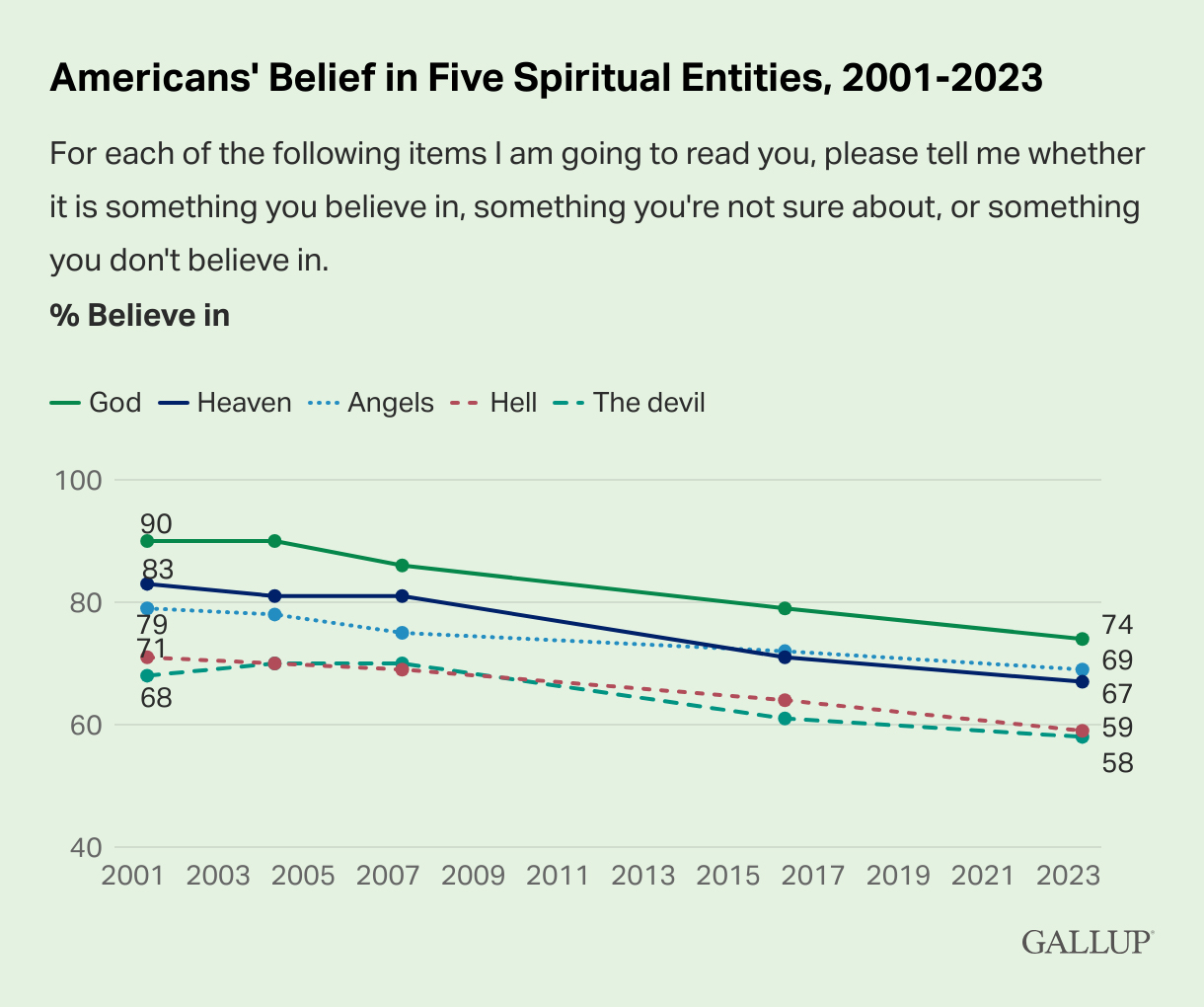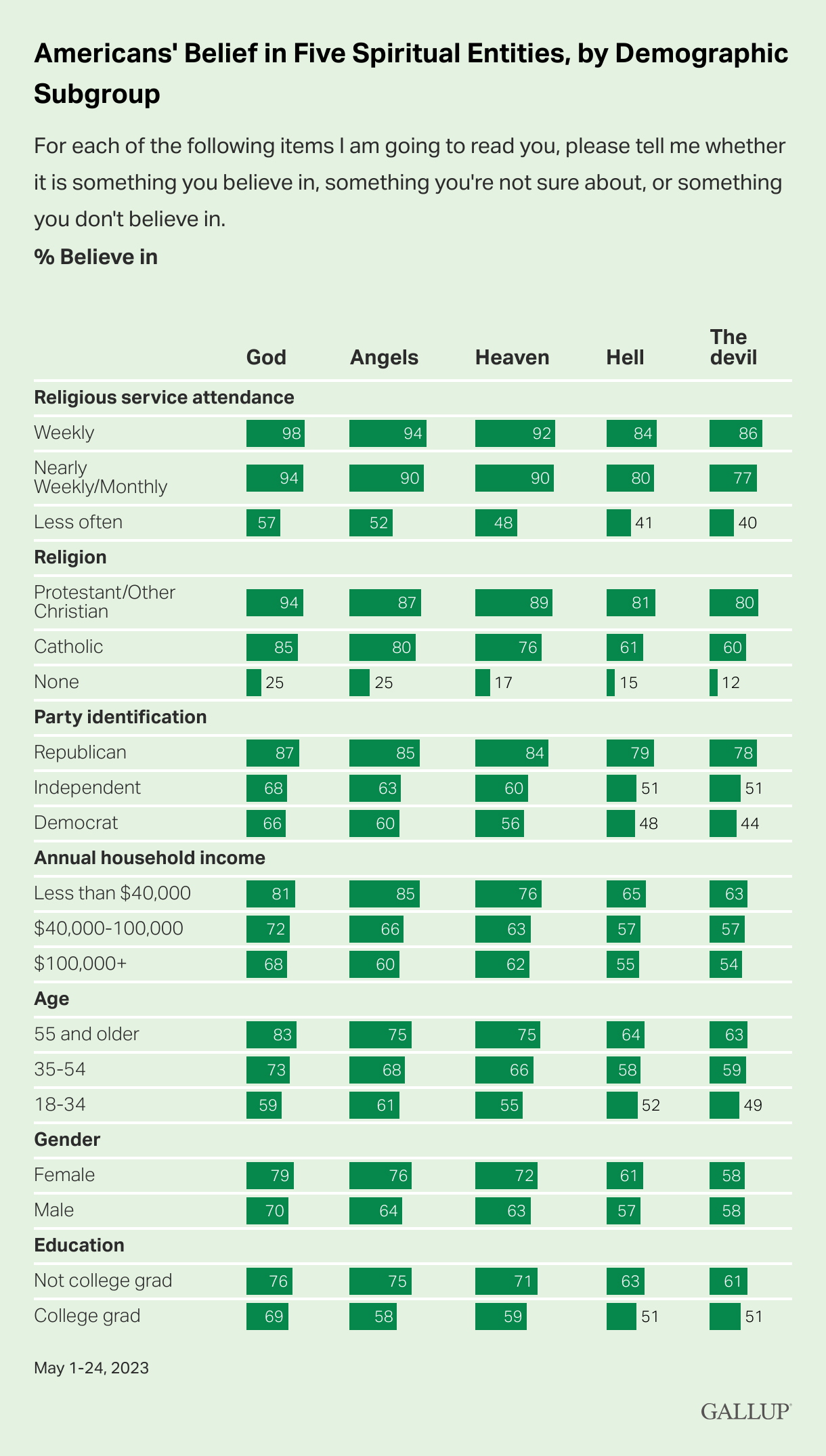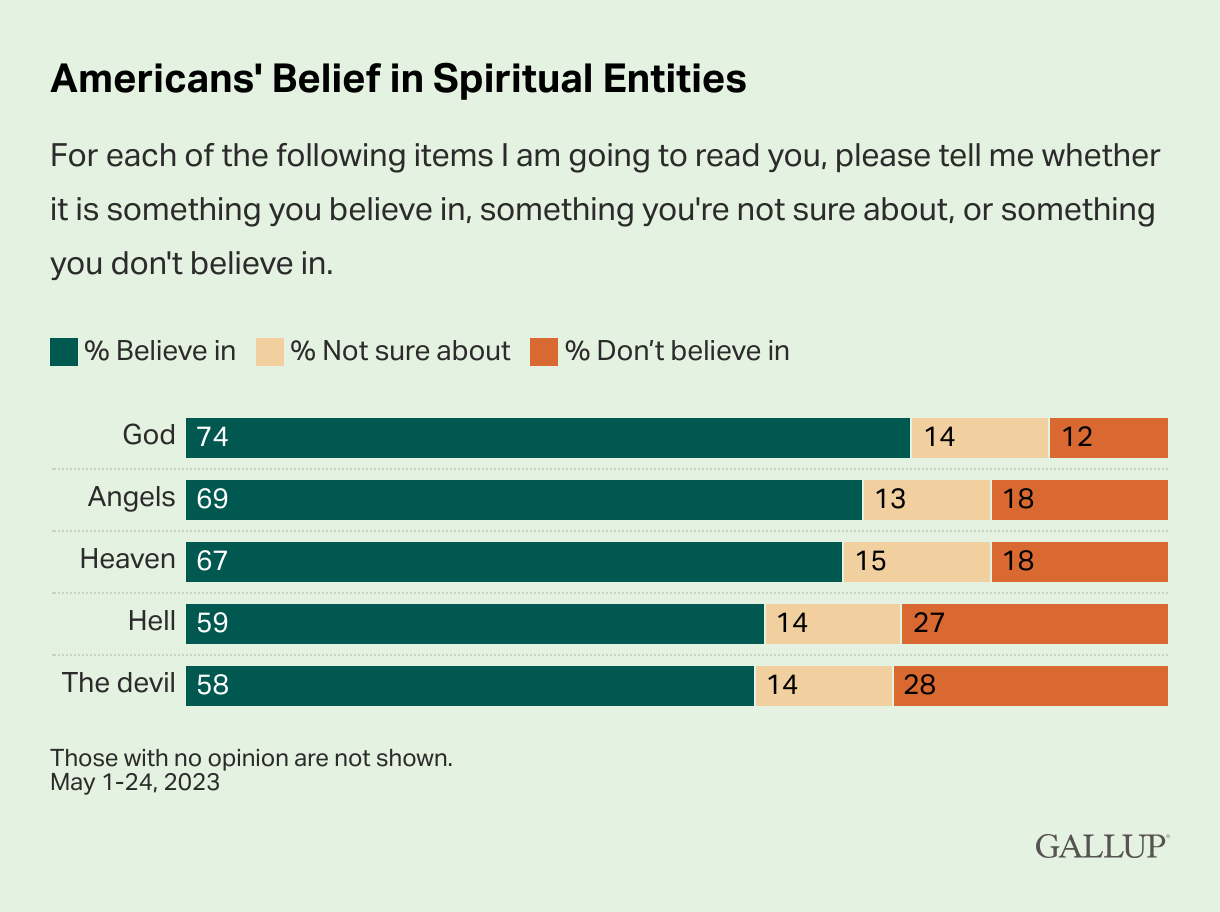(RNS) — The 21st century has been hard on God, with faith in the divine and organized religion facing unrelenting decline.
The devil, it turns out, is not doing much better.
Losing faith in God seems to be accompanied by disbelief in the devil, according to a new Gallup report that found that more than half of Americans (58%) said they believe he exists, down from two-thirds (68%) in 2001. About the same percentage (59%) said they believe in hell, down from 71% two decades ago.
The poll of 1,011 adult Americans, taken in May 2023, asked about beliefs in five spiritual entities: God, the devil, angels, hell and heaven. Belief in all five is at its lowest point since Gallup began polling about these five topics in 2001.
Belief in God (74%) dropped from 90% in 2001 to 74% in 2023. Belief in heaven was down from 83% to 67%, while belief in angels dropped from 79% to 69%.

“Americans’ Belief in Five Spiritual Entities, 2001-2023” Graphic courtesy of Gallup
The loss of faith in God and spiritual entities parallels a decline in religious identification and membership in faith communities. About 1 in 3 Americans claims no religion, a number that other recent studies say could grow to more than half by 2070. Fewer than half of Americans say they are members of a house of worship.
Just as people are divided about whom to vote for and what public policies to promote, politics also divided Americans when it comes to God, the devil and the afterlife. Republicans are more likely to believe in hell (79%) and the devil (78%) than Democrats, 48% of whom said they believe in hell. Forty-four percent believe in the devil.
Those with household incomes under $40,000 are more likely to believe in the devil (63%) and God (81%) than those with $100,000 in income. Among that higher income bracket, 54% said they believe in the devil while 68% said they believe in God.
White Americans are less likely to believe in God (70%) and the devil (66%) than Americans from other ethnic backgrounds.
Protestants were slightly more likely to believe in both heaven (89%) and hell (81%) than Catholics — where three-quarters (76%) believe in heaven and 61% believe in hell. Twice as many of the so-called nones — Americans who claim no religion — said they believe in God (25%) as say they believe in the devil (12%).

“Americans’ Belief in Five Spiritual Entities, by Demographic Subgroup” Graphic courtesy of Gallup
Meghan Henning, the author of “Hell Hath No Fury,” which looks at early Christian ideas about the afterlife, said she’s not surprised that Protestants, who include the nation’s evangelical Christians, retain higher levels of belief in the devil and hell than other Americans. Both are helpful when trying to evangelize people. Preachers, she said, often used the fear of hell to motivate people to accept Jesus as their savior.
It may scare them into church: Those who attend services weekly are most likely to believe in God (98%), angels (94%), heaven (92%), hell (84%) and the devil (86%). Those who attend services less than monthly are less likely to believe in God (57%), angels (52%), heaven (48%), hell (41%) and the devil (40%).
That’s not exactly how early Christians used the idea of hell, said Henning, an associate professor of Christian origins at the University of Dayton. Those early Christians — inspired by the horror of Roman jails — created images of hell and punishment to motivate people to do the right thing in this life.
Fear of hell, she said, was used to motivate people to care for the poor or to live out the virtues of the Sermon on the Mount. That’s very different from how the fear of hell is used today, she said — where failing to care for the poor is not one of the prime sins that Americans care about.
That’s very different from the Bible’s teachings, she said.
Henning said Gallup’s findings about income and belief in hell and the devil have some parallels in early Christianity. Those early Christians who wrote the New Testament were marginalized and had very little power. The idea of hell and punishing people for their evildoing — or rewarding them for good deeds — was very empowering, she said.
When people have been treated unjustly, she said, they want to believe that there are forces at play to set things right in the end. “Otherwise, it all feels hopeless,” she said.

“Americans’ Belief in Spiritual Entities” Graphic courtesy of Gallup
Stephanie Buckhanon Crowder, professor of New Testament and culture at Chicago Theological Seminary, wonders if some Americans are thinking of the real world — rather than the afterlife — when asked if hell exists. “Before we even get to the spiritual realm,” she said, “I think when people are asked, is there a Hades that people are experiencing here on earth.”
Joseph Baker, a sociologist of religion at East Tennessee State University and co-author of “Fear Itself,” said that those who believe in hell tend to support more authoritarian and punitive ideas and experience more depression. But he added some of the positive aspects of spirituality can balance out those negative associations.
The Enlightenment — the post-Renaissance movement in which reason replaced belief in Western culture — began the devil’s decline, said Joseph Laycock, an associate religion professor at Texas State University. Enlightenment ideas helped turn the devil into more of a fictional character in the arts and literature than a spiritual being with real power in the popular imagination. The Enlightenment caused some theologians to “kick the devil out of Christianity,” he said.
The dynamic played out more recently in the success of the 1973 film “The Exorcist,” according to Laycock. The graphic depiction of demonic possession led some clergy to downplay the devil as a spiritual power and to view hell and the devil more as metaphors.
“I actually think the success of ‘The Exorcist’ in 1973 was connected to the attitude that Satan is just a myth,” he said. (More bad news for Satan: A trailer for the sequel to “The Exorcist” just debuted this week.)
The decline in belief in the devil could have a downside, said Laycock. He said his wife, Natasha Mikles, an assistant professor at Texas State, teaches a class about hell and her students frequently come in thinking that hell is just a “scary story meant to control people.”
“That’s not wrong,” he said. “But it also gives people an idea of justice.”
Mark Leuchter, a religion professor at Temple University who studies ancient Judaism, said the devil and hell still have relevance in modern culture. Leuchter, who is teaching a class on the history of the devil, said that whether you believe in an actual satanic figure or not, the devil serves as a symbol of all that is wrong in the world.
The existence of the devil is an argument that we live in an unjust universe, rather than a chaotic one without meaning, said Leuchter.
“If there is a devil who is the enemy of God, who will eventually be punished at the end of time — then you can look forward to the universe bending towards justice.”
Leuchter also said that believing in the devil means being aware of the potential for evil in every human heart — even among the most spiritual people.
“If you’re playing by the rules of religious scripture, then to ignore the potential for evil within human communities and in the human soul is to ignore the rules of the game you profess to play,” he said.





